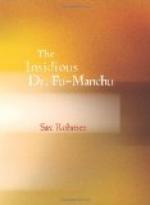The narration of his weird experience revived something of the natural fear which it had occasioned. He raised his glass, with unsteady hand, and drained it.
Smith struck a match and relighted his pipe. He began to pace the room again. His eyes were literally on fire.
“Would it be possible to get Mrs. Weymouth out of the house before to-night? Remove her to your place, for instance?” he asked abruptly.
Weymouth looked up in surprise.
“She seems to be in a very low state,” he replied. He glanced at me. “Perhaps Dr. Petrie would give us an opinion?”
“I will come and see her,” I said. “But what is your idea, Smith?”
“I want to hear that knocking!” he rapped. “But in what I may see fit to do I must not be handicapped by the presence of a sick woman.”
“Her condition at any rate will admit of our administering an opiate,” I suggested. “That would meet the situation?”
“Good!” cried Smith. He was intensely excited now. “I rely upon you to arrange something, Petrie. Mr. Weymouth”— he turned to our visitor—“I shall be with you this evening not later than twelve o’clock.”
Weymouth appeared to be greatly relieved. I asked him to wait whilst I prepared a draught for the patient. When he was gone:
“What do you think this knocking means, Smith?” I asked.
He tapped out his pipe on the side of the grate and began with nervous energy to refill it again from the dilapidated pouch.
“I dare not tell you what I hope, Petrie,” he replied— “nor what I fear.”
CHAPTER XXIX
Dusk was falling when we made our way in the direction of Maple Cottage. Nayland Smith appeared to be keenly interested in the character of the district. A high and ancient wall bordered the road along which we walked for a considerable distance. Later it gave place to a rickety fence.
My friend peered through a gap in the latter.
“There is quite an extensive estate here,” he said, “not yet cut up by the builder. It is well wooded on one side, and there appears to be a pool lower down.”
The road was a quiet one, and we plainly heard the tread— quite unmistakable—of an approaching policeman. Smith continued to peer through the hole in the fence, until the officer drew up level with us. Then:
“Does this piece of ground extend down to the village, constable?” he inquired.
Quite willing for a chat, the man stopped, and stood with his thumbs thrust in his belt.
“Yes, sir. They tell me three new roads will be made through it between here and the hill.”
“It must be a happy hunting ground for tramps?”
“I’ve seen some suspicious-looking coves about at times. But after dusk an army might be inside there and nobody would ever be the wiser.”
“Burglaries frequent in the houses backing on to it?”




